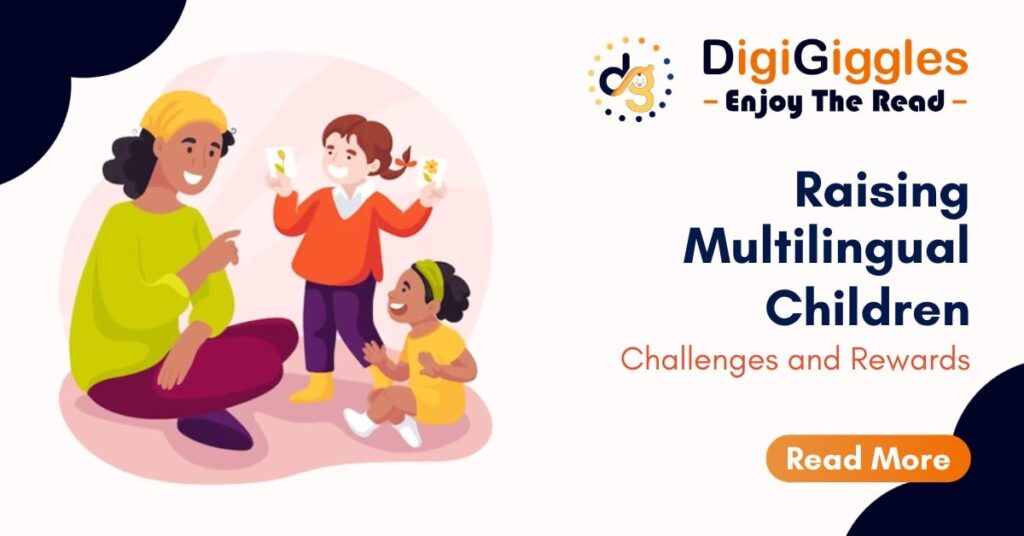
In an increasingly globalized world, the ability to speak multiple languages is a valuable skill that can open doors to new opportunities and experiences. Many parents aspire to raise multilingual children, hoping to provide them with a competitive advantage and an appreciation for diverse cultures. However, this journey comes with its own set of challenges and rewards. In this blog, we’ll explore the complexities of raising multilingual children and the incredible benefits it offers.
Understanding the Terminology
Before we delve into the challenges and rewards of raising multilingual children, let’s clarify some terminology. There’s often confusion between the terms “bilingual” and “multilingual.” Traditionally, “bilingual” referred to the ability to speak two languages, while “multilingual” indicated proficiency in three or more languages.
Today, many experts use “bilingual” to describe individuals who are fluent in two or more languages. This distinction is essential to understanding the nuances of multilingualism.
The Challenges of Raising Multilingual Children
- Choosing the Right Approach: One common challenge parents face is deciding on the best approach to teach their children multiple languages. The one-person, one-language (OPOL) method, where one parent speaks one language while the other speaks a different language, is often recommended. However, this method doesn’t guarantee that children will become proficient in both languages. Many factors, such as the amount of exposure to each language, influence language acquisition.
- Balancing Language Use: Another challenge is balancing the use of languages. Multilingual children may mix languages in the early stages, which can be confusing. Parents need to find ways to ensure that children can differentiate and use each language appropriately.
- Language Discrimination: Multilingualism often faces challenges based on the prestige attached to specific languages. In many parts of the world, certain languages are more respected than others. This can lead to a lack of motivation for children to learn and use their mother tongue if it is not highly regarded. Language discrimination can affect a child’s self-esteem and sense of belonging.
- Maintenance of Proficiency: To ensure that children maintain their proficiency in all languages, parents must commit to consistent exposure. Children may encounter situations where one language dominates, such as attending school in one language. Parents must actively seek opportunities for their children to practice and use all their languages.
The Rewards of Raising Multilingual Children
- Cognitive Benefits: Research shows that multilingual children tend to exhibit better cognitive flexibility. They develop the ability to switch between tasks more efficiently, and their brains may exhibit better tissue density, leading to improved cognitive responses. This cognitive advantage can have a lasting impact on their academic and professional lives.
- Improved Literacy Skills: Multilingual children often excel in reading and writing. Learning different languages exposes them to diverse linguistic structures, enhancing their understanding of language. This, in turn, can improve their literacy skills, making them effective communicators and writers.
- Cultural Understanding and Empathy: Multilingualism fosters a broader perspective of the world. Children who speak multiple languages are more likely to appreciate cultural diversity, practice tolerance, and embrace different ways of thinking and living. This not only enriches their personal lives but also contributes to a more harmonious society.
- Career Opportunities: In today’s global job market, being multilingual is a valuable asset. Many employers seek individuals who can communicate in multiple languages, particularly in international business, diplomacy, and the tourism industry. Multilingual individuals often have a competitive edge in these fields.
- Delay in Cognitive Decline: Multilingualism has been linked to a delay in cognitive decline in later years. Some studies suggest that multilingual individuals may postpone the onset of diseases like dementia by up to five years. This further highlights the long-term benefits of raising multilingual children.
- Enhanced Creativity: Multilingual individuals are often more creative in their problem-solving approaches. The exposure to different languages and cultures encourages them to think outside the box and explore innovative solutions.
- Increased Career Opportunities: Being multilingual can significantly expand a person’s career prospects. In our interconnected world, companies value employees who can effectively communicate with a broader range of clients and partners. This can lead to more job offers and better positions.
Conclusion
Hence, the journey of raising multilingual children is both challenging and rewarding. Parents who embark on this path may encounter obstacles in language teaching and face issues related to language discrimination. However, the cognitive, academic, and cultural advantages that multilingualism offers are substantial. As parents, the decision to raise multilingual children contributes not only to their future success but also to a more inclusive and empathetic world. The challenges may be real, but the rewards are undoubtedly worth the effort. Furthermore, the benefits of multilingualism extend far beyond cognitive development; they include enhanced creativity, career opportunities, and a delay in cognitive decline. In a world where connections and understanding among cultures are more critical than ever, raising multilingual children is an investment in a brighter and more globally harmonious future. So, while the path may be challenging, the rewards of raising multilingual children are immeasurable.